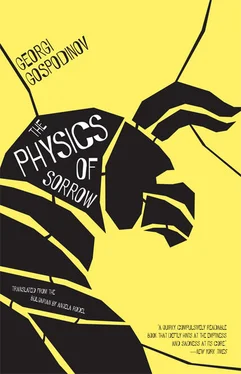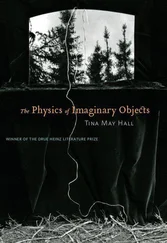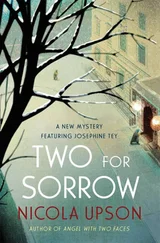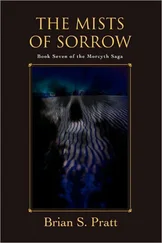Now I know. I don’t want to relive any of the so-called events from my own life — not that first event of being born, nor the last one which lies ahead, both are uncozy. Just as every arrival and departure can be uncozy. Nor do I want to relive my first day of school, my first time having fumbling sex with a girl, nor my joining the army, nor my first job, nor that ostentatious wedding reception, nothing. none of that would bring me joy. I would trade them all, along with a heap of photos of them, for that afternoon when I’m sitting on the warm steps in front of our house, having just woken up from my afternoon nap, I’m listening to the buzzing of the flies, I’ve dreamed about that girl again who never turns around. My grandfather moves the hose in the garden and the heavy scent of late summer flowers rises. Nothing is determined, nothing has happened to me yet. I’ve got all the time in the world ahead of me.
In the small and the insignificant — that’s where life hides, that’s where it builds its nest. Funny what things are left to twinkle in the end, the last glimmer before darkness. Not the most important things, nor. there’s no way for them even to be written down or told. The sky of memory opens for that minute as dusk falls on that winter day in a distant city, when I am eighteen and have miraculously been left alone for a minute or two, crossing the army base’s enormous parade grounds. A parenthetical note for those who have never been soldiers: you’re never left with a free minute, that’s the way it’s set up. A soldier with free time on his hands is nothing but trouble, that’s what they say. I’ve trimmed the grass around the parade grounds all day with a nail clipper — those were my orders. I’ve carried stones from one pile to another. In the morning. Then in the afternoon I’ve returned the stones to their original place. At first you don’t get it, you think the world has gone mad, you don’t find that even in Kafka. But the majors don’t read Kafka, to say nothing of the sergeants. You’ve come here directly from literature, you’re carrying Proust in your gasmask bag. Hey, Proust, get over here double-quick! Hit the ground! Twenty push-ups!
Anyway, that moment when I was left alone on the enormous parade grounds under an empty sky, amid the cold air saturated with the first scent of winter, of wood and coal smoke sneaking in from the nearby village, the falling dusk and anticipations, alone for the first time, somewhere else for the first time, slight cold fear, cold clouds. And precisely that meeting of hopelessness and anticipation (my year in the army had only just begun), mixed with an endless sky, strange and beautiful, beautiful in a strange way, made that minute eternal. I knew that it couldn’t be retold.
Of course, I could list off several other golden camels in the endless caravan of minutes, three or four, not more, but I’ll try to retell only one of them. Late summer, I’m standing in front of the house, the sunset is endless in those flat places, I’m six, the cows are coming down the road, first you hear their slow bells, the shepherd’s calls, the mooing to announce their return to their calves, the calves’ bellowed response. this is crying, I know it even then. Like the bawling cry that always escapes from me the minute my mother comes back from the city at the end of the week to see me. Relief and accusation are never closer together than in that crying. As close as the crying of a calf and the crying of a child when they have been abandoned for a day or weeks. I missed you so much, I’m so mad at you. I’ll never forgive you, cows and mothers.
In that minute, the memory is so clear even now, in that minute so densely packed with sounds, cows, and scents, suddenly everything disappears, a strip slices the horizon at its most distant point, time draws aside and there, at the very back of the sunset, there is a white room with high ceilings, one I’ve never seen before, with a chandelier and a piano. A girl my age is sitting at the piano with her back to me. Her light hair is tied in a pony tail, she is getting ready to play, she has raised her hands slightly, I see her pointy elbows. And that’s it.
I have never been happier, more whole and peaceful than in that minute, on the warm stone at the end of my sixth summer. As the years passed, I started counting the winters, as my father and grandfather did, they knew it was right for a person to go back home in the winter, during the summer there is too much work to bother with dying. I promised myself then that I would find that girl. I kept looking for her in all those places and years I passed through. No one turned to me with her face. I can feel myself giving up over time. Getting used to it. Old age is getting used to things.
MIGRATION OF SORROW
Empathy is unlocked in some people through pain, for me it happens more often through sorrow.
The physics of sorrow — initially the classical physics thereof — was the subject of my pursuits for several years. Sorrow, like gases and vapors, does not have its own shape or volume, but rather takes on the shape and volume of the container or space it occupies. Does it resemble the noble gases? Most likely not, as much as we may like the name. The noble gases are homogeneous and pure, monatomic, besides they have no color or odor. No, sorrow is not helium, krypton, argon, xenon, radon. It has an odor and a color. Some kind of chameleonic gas, that can take on all the colors and scents in the world, while certain colors and scents easily activate it.
The more important thing is that its gravitational field is negligibly small, to continue the analogy with the gases. From this it follows that invisible fronts, cyclones, and anti-cyclones of sorrow hover around us. Their migration, their movement from one place to another is a remarkable fact. The blindness that causes us to pass over this fact is astonishing. Sometimes I’m overcome by a vague sense of sorrow, which doesn’t seem to be mine. Sorrow from Northern Africa, let’s say. Not local, strange, faded by the sun, yellow with grains of sand from the desert, like that yellow rain that fell last year, leaving opaque blotches on the window. I could sketch out a geographical map of the migration of sorrows. Some places are sad in one century, others in another.
What little success I’ve had with these experiments lies in the fact that for very short slices of time I’ve been able to attract a stray cloud of sorrow from some past afternoon, mine or someone else’s, to walk alongside it, and sink into its nicotine. Like a smoker, who, even after many years without cigarettes, will always recognize the trace of smoke.
QUANTA OF AGING
I’m not talking about old age. I’m talking about the first signs. Not about night, but about dusk. About its irresistible incursions and the first fallen fortresses.
Once, when Aya was three, she came home from kindergarten in tears, because a boy had told her that fathers get old. Fathers get old, she said, sobbing. She glanced at me for a second, fully expecting to hear me disavow this and since I couldn’t think of anything — I’m terribly slow-witted when I have to lie — she burst into tears again, even more hopelessly.
There is some sort of grammar of aging.
Childhood and youth are full of verbs. You can’t sit still. Everything in you is growing, gushing forth, developing. Later the verbs are gradually replaced by the nouns of middle age. Kids, cars, work, family — the substantial things of the substantives.
Growing old is an adjective. We enter into the adjectives of old age — slow, boundless, hazy, cold, or transparent like glass.
There is also a mathematics of aging, a simple set theory.
We change the world’s proportions over the years. Those younger than we are grow ever more numerous, while the number of those older than we are declines menacingly.
Читать дальше












